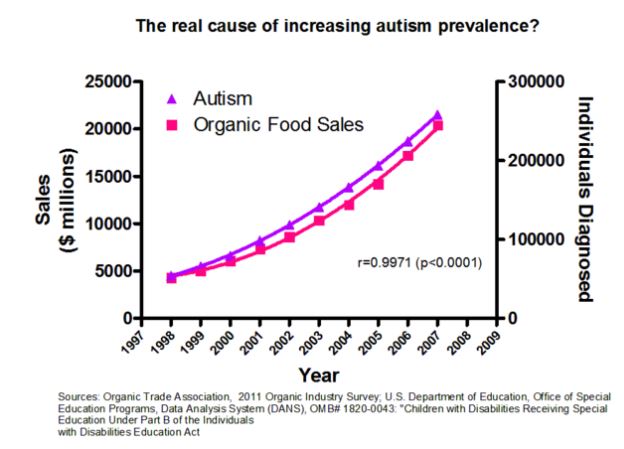The answer is statistics. The same curve that can show autism is linked to organic food can link autism to anything and if you are at Columbia University's Mailman School of Public Health you are very much against corporations and in need of a way to get in the New York Times, so a recent paper links DDE, a metabolite of DDT, in the blood of pregnant women to autism.
Autism is low-hanging fruit for statisticians. Most people are obviously not for it (though plenty of people with autism obvously do not feel they are as defective as Columbia epidemiologists do) and so the authors went ahead with their desire to finally try and show a link between autism and a pesticide. Really, they'd like any pesticide, the glyphosate jury award last week show science is irrelevant in court cases.
They identified 778 cases of childhood autism spectrum diagnoses in kids born between 1987 and 2005 among women in the Finnish Maternity Cohort, which was 98 percent of Finnish pregnant women. Maternal blood taken during pregnancy was analyzed for DDE, a metabolite of DDT, and PCBs, which are another prime target of environmental activists.
Their statistics declared that mother's DDE levels in the top quartile could have a two-fold greater risk of having a child with an autism diagnosis. There was no association between maternal PCBs and autism. Why? They speculate that DDE causes low birthweight, because a study in rats declared that. Epidemiologists used to know rats are not little people but that level of detailed zoology isn't taught in school any more, which is why when we have met with NIH administrators we have asked that these NIH-funded epidemiology studies have a giant red EXPLORATORY across the top.

The big problem: that is out of 1,000,000 pregnancies. Neutral epidemiologists note the distinction between relative and absolute risk and this group ignores it. If we claim cheese doubles your risk of cancer, you will be alarmed. If we instead accurately tell you that cheese takes your risk of cancer from 1 in 10,000,000,000 to 2 in 10,000,000,000, you will not have reason for concern. Nor should you. 778 out of 1,000,000 is what neutral epidemiologists call statistical noise.
Yet the authors feel safe making the claim because DDT breaks down slowly - and people have forgotten by now that those with the most exposure to DDT never got any illnesses outside the ordinary. Which means they are left with endorsing a u-shaped - high levels are obviously bad, normal exposure is harmless, but trace amounts are as harmful as overdoses. That is the basic of homeopathy, which became the basis for the whole endocrine disruptor movement that anti-science publications like Environmental Health News promote.
"We think of these chemicals in the past tense, relegated to a long-gone era of dangerous 20th Century toxins," says lead author Alan S. Brown, MD, MPH, professor of Epidemiology at Columbia University's Mailman School of Public Health. "Unfortunately, they are still present in the environment and are in our blood and tissues. In pregnant women, they are passed along to the developing fetus. Along with genetic and other environmental factors, our findings suggest that prenatal exposure to the DDT toxin may be a trigger for autism."
The authors ignore the other, even bigger confounder, in their desire to scaremonger chemicals. Autism diagnoses are way, way up, so the numbers would have increased despite the presence of organic copper sulfate or Bt spray or anything else. Those can all be linked to autism the same way.



Comments